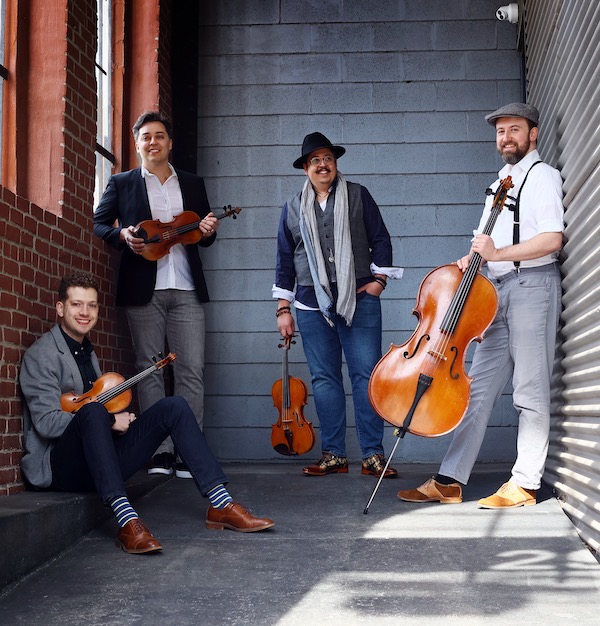Beo String Quartet makes an outstanding New York debut
The early 21st century will likely go down as a golden age for string quartets. There are so many outstanding quartets that play the standard repertoire and new music brilliantly that they outstrip the descriptive vocabulary.
The latest group to impress is the Beo String Quartet, which made its New York City debut Tuesday evening with a superb concert at the Morgan Library.
Though new to this city, the Beo launched in 2015, and have already premiered several dozen works. On Tuesday the quartet played the local premiere of People, composed by the group’s violist Sean Neukom. In this compact “rush hour” program at the Morgan, the quartet also performed Missy Mazzoli’s Enthusiasm Strategies, five fugues from Bach’s The Art of Fugue, and Shostakovich’s String Quartet No. 8.
The level of string training and playing is so high these days that one expects exact intonation and clear articulation from quartets, at all speeds and dynamic levels; remarkable playing is the standard. The Beo Quartet had all that technical facility, to which they added a sound that was grainy with a touch of velvet, robust and woody—superior technique wrapped in a classic sound. Inside the historic room of J. P. Morgan’s own library, in the company of books and music manuscripts, and with the space’s excellent acoustic, the sheer sound of the quartet was invigorating and deeply satisfying.
As was their artistry, which came across in both the programming and the playing. Enthusiasm Strategies opened, and there was added interest hearing this shortly after the Kronos Quartet’s recent appearance. Mazzoli’s piece was commissioned by Kronos for that quartet’s “Fifty for the Future” project, and the music is available to any quartet. One of the points of the Kronos project is that the music can be played by musicians below the skill level of the Beo musicians, and it was fascinating and affecting to hear such a fine group play this music.
The piece is a distillation of Mazzoli’s style, fitting together harmony, rhythm, and a few key gestures into a form that builds tension like a slow-motion explosion. There was a surging flow to the quartet’s playing, a focus on strength, and the music’s innate power and elegance were just enough to contain the quartet’s muscular performance. This was exciting and also more than just sensation, the Beo was in touch with the expressive heart of the music.
That passion continued in the Bach selections, in which the quartet’s grainy timbre was an excellent vehicle for the music. Playing Fugues I, II, VII, IX, and XIX, the quartet led the listener through the themes and fugal structures with a fine balance between transparency and robust energy. There was a gradual and natural ebb and flow of power as voices added and detached, and some smart and graceful variations within phrases. This was a terrific example of how well this music translates to multiple instruments, and a real lesson in how Bach, played live, can produce intense and deep feelings normally associated with later eras in classical music.
For a moment, Neukom’s piece threatened to lower the temperature of the evening. The concept of the music is a cliché, the birth, growth, and descent of a human being, and it began with clichés: bows bouncing off the violins, the cello piecing together a melody under a repeated viola note. This was atmospheric but not promising.
When the music and its form came together with plainspoken phrases and harmonies, it was engrossing, even remarkable. People rose, and also took unexpected turns, and a whistled melody that might have just been an effect became, through its quirky shape and careful placement, startling, and then it became something one eagerly awaited. This hit with an expressive force equal to the previous pieces.
With all this skill, passion, and strength, one expected great things from the Shostakovich performance, and the quartet did not disappoint. This was an ideal pairing of playing and compositional styles—the quartet’s sheer expressive force added tremendous weight to Shostakovich’s theme, even as the delivery was slightly understated. The group had a supple way with the music’s changing timbres, and the range of their playing, with mutes and at extremes of speed and dynamics in the Allegro molto, was thrilling. The quietest and most active music were equally intense, without sentimentality or brittleness.
The audience was a key measure of how good this concert was. Their attention was so drawn in that one heard that rarest of all things in a New York concert hall—silence; the silence of people listening and letting the experience sink in as the last note decayed, knowing there would be time to applaud.
Tabea Debus and Adam Cockerham play music for recorder and archlute, 6:30 p.m. February 28 at the Morgan Library. themorgan.org
